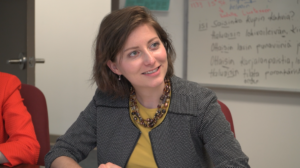Getting Stuck on the Language Learning Plateau?
.png)
Do you ever feel stuck on your language learning journey? Do you ever feel like you’re hitting a wall? Stagnating, while trying to achieve language fluency? Welcome to the ‘plateau’. Derived from the geographical term, the linguistic term also suggests an elevated, yet flat space. A linguistic plateau is an intermediate (up to upper-intermediate) level of language ability that every learner has trouble overcoming. Sounds serious, right? Well, let’s first start on a positive note – congratulations! You have made the long climb up and have been through a lot of ups and downs through grammatical rocks and vocabulary wastelands. So what does this plateau encompass? See if you recognize yourself in the description below?
Motivation
Beginners often derive great satisfaction from learning a new language, the progress is quite apparent and the new student is eager to learn as new material stimulates their mind. As a learner progresses to an intermediate level, the progress is harder to track and the learning curve rather appears flat. I like to compare intermediate level to a snowball – you need to roll the ball from all sides to add more snow (to make it bigger) while making sure the snow on the other side is not falling off. Therefore, on the intermediate level, learners must invest a lot of time in the learning process as the complexity of structures are harder and harder to master, and at the same time they need to pay attention to everything they have already learned. Obviously, frustration, stress and lack of motivation are often found on the plateau. Students do not feel motivated to sit down to study as they see a disconnect between the time they put in and the output they are getting.
As a beginner, getting a grasp of past tense gives you a great sense of accomplishment. Suddenly you can say so much more! In comparison, you don’t get such a feeling from studying prepositions with verbs.
Oh, listening – do we really need to…?
One of the other symptoms of being stuck on the plateau is a clear gap between active and passive reproduction. While a student’s passive skills reach a high level, the student often expresses a negative attitude toward speaking or listening. Very often, my students loudly express their difficulties and negative approach before practicing one of the active skills (often speaking or listening). If they like grammar, they would rather work on grammar exercises instead of focusing where they are lacking, as it naturally frustrates them.
‘she goes home’
Grammatical mistakes of one kind which occur on a regular basis are also another sign of being stuck on the plateau. While the learner can communicate well, the speech contains faulty grammatical structures that are ‘carved into stone’. For English learners, omitting ‘s’ for the third person singular is one of the examples.
Almost there…
The vocabulary for plateau students is often at a low level in speaking (even though their passive vocabulary has quite a wide range), students choose to use easier words and simplified phrases. It is naturally more comfortable and they don’t want to risk making a mistake. For native speakers, their choice of phrases may sound too formal or sometimes bookish.
While the plateau definitely requires a lot of time and effort to overcome, it is not impossible. In the next article we will give 5 tips on how to do so.
If you are struggling with overcoming the language learning plateau, let us help you. ICLS offers foreign language classes in 85+ languages and any level, in group or private format.
Author: Eliska Prushankin

Eliska has been teaching Slovak and Czech at ICLS for almost a year. Growing up in a family full of teachers, she fell in love with teaching at an early age. Teaching languages allows her to connect with people from different countries, something that she treasures.


